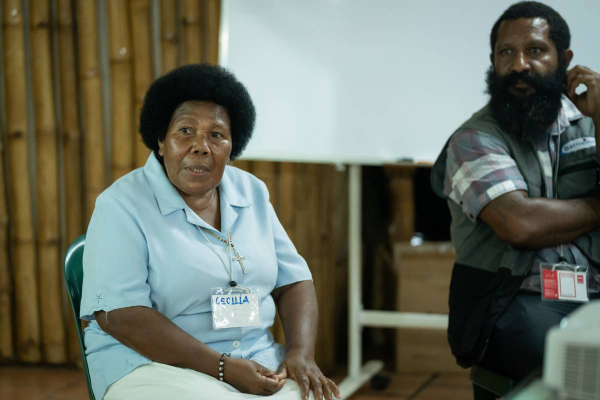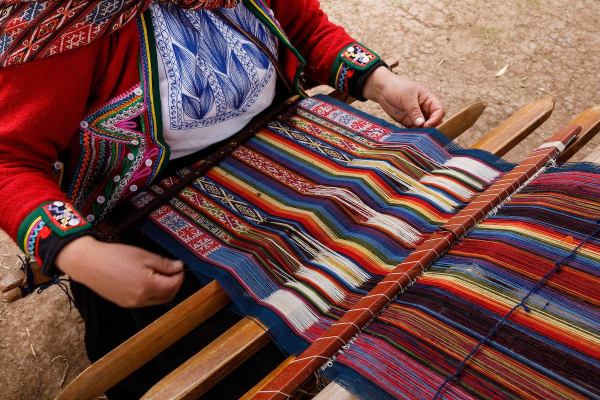Not Just Passing Through: A Conversation With Natasha Sistrunk Robinson

Natasha Sistrunk Robinson is on a journey.
When she left her childhood home in South Carolina to attend the United States Naval Academy in Maryland, Natasha didn’t know that her path would eventually lead beyond serving as an officer with the Marine Corps. In fact, Natasha’s journey would involve proclaiming truth in churches and board rooms across the country. “I am a leader, I love Jesus and I love God’s Word, so a lot of what my work entails is at the intersection of my faith and my leadership,” Natasha explained.
Natasha’s road has been marked by devastating loss and liberating joy, but the difficult and beautiful stretches have sparked a passion in her to equip others in their own journeys. As a biblically-based author, speaker, mentor and nonprofit founder, Natasha spends her days training people — from corporate executives to middle school girls — to pursue practical character, spiritual and social growth steps.
Living as Sojourners
Over the past few years, Natasha and her family have moved multiple times while she’s traveled extensively for work. At times, this has left Natasha feeling like she doesn’t have a true home. “In some parts of my journey when I was younger, that sense of [not having a home] felt lonely,” she shared. “People don’t always understand the mission or the call that’s on your life.”
Natasha admitted that finding less challenging work would probably be comfortable, but she’s also confident that God works through her mobile ministry — just as he has worked through the mobility of his people in the past.
“When we read the Bible, we see that God describes us as sojourners in a land … not citizens of this earth,” Natasha pointed out. She sees many examples of God’s people living like nomads throughout Scripture like Abraham, Paul and especially Jesus himself. “All that transition is something that God [was] using,” she continued, emphasizing that transience was also central to the beginning of the church: “[The book of Acts] starts out with a group of disciples in one place, and then they start moving all over the place. As they move, the gospel expands.”
Not only does Natasha believe God often uproots his people from their comfort and stability in order to work through them, but she also sees great benefit in the opportunity to meet people from many places and backgrounds: “I think we get to learn by being connected and approximate to different groups of people, seeing the world through their lens. It makes us more compassionate … and helps us increase in wisdom, knowledge and understanding.”
Natasha has especially grown through worshiping with Christians from biblically-rooted traditions other than her own: “The beauty is that people are connecting with God and connecting with Jesus in different ways all across the world.” Seeing God through the eyes of a wide variety of her brothers and sisters in Christ has deepened her relationship with her heavenly Father: “I’m able to connect with God in very intimate ways. That’s been a blessing in my life.”
Speaking the Truth
As Natasha has recognized her own restlessness in this world, she’s found deep significance in the story of another sojourner — Moses. “In black church culture and tradition in America, we have a lot of our history grounded in the Exodus narrative. … It’s the traditional story of good and evil, light and darkness, truth and falsehood and all these things that showed up in my life and the story of my people.”
In her book, “A Sojourner’s Truth: Choosing Freedom and Courage in a Divided World,” Natasha skillfully weaves her experiences as an African American woman together with scriptural lessons from Moses’ life and leadership. “It gave me a great opportunity to tell my story alongside Moses and the Exodus narrative, which gave me a chance to tell the broader African American story,” she explained.
Natasha not only resonates with the themes of redemption and freedom in Exodus, but she’s also challenged to speak bold truth to the body of Christ — including herself — the same way Moses called Israel to repentance. “I think there’s pride and self-righteousness in our culture,” Natasha observed. “It would be unloving of God not to correct us.”
Freedom From Idolatry
Natasha believes God especially wants to expose and correct the sin of idolatry, which is the practice of valuing anything above God and his ways. While the concept of idolatry may bring to mind ancient civilizations and/or statues of false gods, Natasha recognizes that the Western church tends to idolize things that enable our own comfort, such as political power and money. “I think we need to be specific about naming that idolatry [for] that sin to be corrected,” she stated. “Are you putting your hope and trust in God, or are you putting your trust and hope in money [and politics]?”
“This is why the Bible talks about … the danger of wealth and the danger of comfort because when we get these things, we have to spend so much energy to hang onto the things of the world,” Natasha continued. “Jesus desires us all to live in freedom so that we’re not bound by sin. We’re free to do the thing that’s right.”
But when the church itself is bound by idolatry, the world notices. “People are crying out because the church has not done what the church has been called to do which is to speak truth in the face of falsehood, to tell the truth in the place of lies, to share love in the place of hate, to be light where there is darkness,” she said. “We say a lot with our lips, but do our actions show we’re willing to sacrifice?”
Humility Before Unity
One of Natasha’s many responsibilities is to lead diversity and inclusion training for churches and organizations. While she’s passionate about equipping the body of Christ to grow in unity across racial and cultural lines, she warns that the road to unity can be uncomfortable. “I don’t think all the Christians in our country are asking the same questions,” she cautioned. “There are people that want to talk about unity but don’t really want to wrestle with the difficulty and the sin and the lies and the history that cause people to continue to be divided.
“People kind of get into their camps and their silos. … [If you do this] the only voices you’re listening to are people who agree with you. It’s very easy to get puffed up with pride and self-righteousness.”
Natasha noted that it’s crucial to broaden our spheres of influence to include other viewpoints: “Listen to some other people,” she recommended. “Read some other people. I’m not saying you have to agree with them. I’m saying check them out and see what they’re saying.”
Natasha believes that the starting point for true unity in the church must be humility.
Rather than using Scripture to prove a point or justify our behavior with others, we need to approach God’s Word with the expectation that we will be changed by his Spirit. “Humility says this: There may be a chance I’m wrong,” she said.
For example, in Western culture much of our understanding of God’s Word has been shaped by the writings of men like Martin Luther and John Calvin. But Natasha noted that these formational European church leaders learned from the writings of Bible scholars who came before them: “The people they read were people from the East, people from Africa and Asia.” Pointing out that Jesus himself was Middle Eastern, she emphasized that Christians need to learn from each other in humility — especially working to include the voices of people who have too often been ignored or silenced.
“There needs to be an honest truth-telling, an honest reckoning, an honest lament about the sins that have occurred and continue to cause harm. Until you do that, there’s not going to be unity. There’s not going to be any true peace. That requires repentance,” Natasha said solemnly. Lasting repentance, she believes, can’t be limited to individual hearts or social media campaigns; it must incorporate authentic, tangible changes in whole churches, organizations and communities.
Drawing From the Well
Natasha acknowledged that challenging things such as racism and idolatry in the church is deeply taxing work. “It’s not always laborious physically, but it’s certainly hard emotionally and spiritually, which can be just as draining on the mind and body,” she shared. She continued with a laugh: “But it’s not my desire or intent to die prematurely because of stress! I can lay down my life for Jesus but also not be a sacrificial lamb, because Jesus has already done that.”
To keep her internal well full, Natasha invests in her physical health, limits her consumption of social media and news sources, and prioritizes rhythms that nourish her soul. “I stay in the Word,” she said. “I practice spiritual disciplines, prayer being paramount among them. I’m really intentional about surrounding myself with people who love me well and aren’t afraid to tell me the truth.” These rhythms help Natasha stay rooted in God’s sovereignty over her life and work: “It’s very freeing to know I’m not responsible for results. God is responsible for results!”
Natasha often studies multiple portions of Scripture simultaneously, moving quickly through some passages and digging more deeply into others, but each year she picks one primary verse to focus on. Currently, her chosen verse is Psalm 27:13: “Yet I am confident I will see the LORD’s goodness while I am here in the land of the living” (NLT).
“We talk about the hope of the life to come, which is true. … But I don’t think we think deeply enough about the ‘now and not yet’ Kingdom of God,” she declared. “As believers, we don’t have to wait to transition [to heaven] to experience the goodness of the Lord.”
Inviting Others to Join the Journey
Natasha, like all of us who are believers in Christ, might be a sojourner on this earth but Natasha also wants every step she takes throughout her life to leave an imprint of truth and love, inviting others to join her on the journey. She hopes those around her learn and grow through her teaching; however, her deeper desire is for people to connect directly with God through Scripture.
“God communicates with us and to us and is made known to us through his Word,” Natasha rejoiced. But she acknowledged that many people still don’t have access to Scripture in a language and format they clearly understand. “It’s a privilege to [have] the Word of God,” she recognized. “The reason I know a lot of Scripture is that I’ve just sat with it for so long. I can recall it because I’ve read the Word a lot.”
“We want the Word to be made available to everyone so they can have that same connection and intimacy with God,” she concluded. “I praise God that we can continue to get God’s Word into the hands of people who don’t have it!”
Learn about topics like spiritual development, mental health, Bible translation, and more at our free, one-hour online event called Explore Wycliffe Live.






